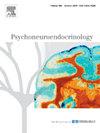Melatonin attenuates intermittent hypoxia-induced cognitive impairment in aged mice: The role of inflammation and synaptic plasticity
IF 3.4
2区 医学
Q2 ENDOCRINOLOGY & METABOLISM
引用次数: 0
Abstract
Intermittent hypoxia (IH), a major pathophysiologic alteration in obstructive sleep apnea syndrome (OSAS), is an important contributor to cognitive impairment. Increasing research suggests that melatonin has anti-inflammatory properties and improves functions related to synaptic plasticity. However, it is unclear whether melatonin has a protective effect against OSAS-induced cognitive dysfunction in aged individuals and the involved mechanisms are also unclear. Therefore, in the study, the effects of exposure to IH alone and IH in combination with daily melatonin treatment were investigated in C57BL/6 J mice aged 18 months. Assessment of the cognitive ability of mice in a Morris water maze showed that melatonin attenuated IH-induced impairment of learning and memory in aged mice. Enzyme-linked immunosorbent assay, polymerase chain reaction, and western blotting molecular techniques showed that melatonin treatment reduced the levels of the proinflammatory cytokines, interleukin-1β, interleukin-6, and tumor necrosis factor-α, decreased the levels of NOD-like receptor thermal protein domain associated protein 3 and nuclear factor kappa-B, lowered the levels of ionized calcium-binding adapter molecule 1 and glial fibrillary acidic protein, and increased the levels of the synaptic proteins, activity-regulated cytoskeleton-associated protein, growth-associated protein-43, postsynaptic density protein 95, and synaptophysin in IH-exposed mice. Moreover, electrophysiological results showed that melatonin ameliorated the decline in long-term potentiation induced by IH. The results suggest that melatonin can ameliorate IH-induced cognitive deficits by inhibiting neuroinflammation and improving synaptic plasticity in aged mice.
褪黑素可减轻间歇性缺氧诱发的老年小鼠认知障碍:炎症和突触可塑性的作用
间歇性缺氧(IH)是阻塞性睡眠呼吸暂停综合症(OSAS)的主要病理生理改变,也是造成认知障碍的重要原因。越来越多的研究表明,褪黑激素具有抗炎特性,并能改善与突触可塑性相关的功能。然而,褪黑激素是否对老年患者因 OSAS 引起的认知功能障碍有保护作用尚不清楚,相关机制也不明确。因此,本研究以 18 个月大的 C57BL/6 J 小鼠为研究对象,调查了单独暴露于 IH 和 IH 与每日褪黑激素联合治疗的效果。对小鼠在莫里斯水迷宫中认知能力的评估表明,褪黑激素减轻了IH诱导的老年小鼠学习和记忆损伤。酶联免疫吸附试验、聚合酶链式反应和免疫印迹分子技术表明,褪黑素能降低促炎细胞因子白细胞介素-1β、白细胞介素-6和肿瘤坏死因子-α的水平,降低NOD样受体热蛋白结构域相关蛋白3和核因子卡巴-B的水平、电离钙结合适配器分子 1 和胶质纤维酸性蛋白的水平降低,而突触蛋白、活动调节细胞骨架相关蛋白、生长相关蛋白-43、突触后密度蛋白 95 和突触素的水平升高。此外,电生理学结果显示,褪黑素可改善IH诱导的长期电位下降。这些结果表明,褪黑素可以通过抑制神经炎症和改善老年小鼠的突触可塑性来改善IH诱导的认知缺陷。
本文章由计算机程序翻译,如有差异,请以英文原文为准。
求助全文
约1分钟内获得全文
求助全文
来源期刊

Psychoneuroendocrinology
医学-精神病学
CiteScore
7.40
自引率
8.10%
发文量
268
审稿时长
66 days
期刊介绍:
Psychoneuroendocrinology publishes papers dealing with the interrelated disciplines of psychology, neurobiology, endocrinology, immunology, neurology, and psychiatry, with an emphasis on multidisciplinary studies aiming at integrating these disciplines in terms of either basic research or clinical implications. One of the main goals is to understand how a variety of psychobiological factors interact in the expression of the stress response as it relates to the development and/or maintenance of neuropsychiatric illnesses.
 求助内容:
求助内容: 应助结果提醒方式:
应助结果提醒方式:


